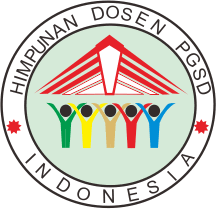Hubungan antara minat dan motivasi belajar dengan hasil belajar kognitif matematika materi geometri di SD
Abstract
This study aims to 1) describe whether there is a relationship between interest and cognitive learning outcomes in geometry for fifth-grade elementary school students, 2) describe whether there is a relationship between motivation and cognitive learning outcomes in geometry for fifth grade elementary school students, 3) describe whether there is a relationship between interest and motivation to learn together with the cognitive learning outcomes in geometry material for fifth-grade elementary school students. This research includes quantitative correlation research with an ex post facto approach. The population of this study were students of class V SD in Garung District, Wonosobo in the academic year 2021/2022. The sample was taken using the Probability Sampling technique. Data collection techniques using tests and questionnaires. Based on the analysis of research data, it can be concluded that 1) There is a positive and significant relationship between interest and cognitive learning outcomes in geometry, 2) There is a positive and significant relationship between motivation and cognitive learning outcomes in geometry, 3) There is a positive and significant relationship between interest and motivation to learn together with the cognitive learning outcomes in geometry. These relationships have a strong degree of correlation.
Keywords
Full Text:
PDFReferences
E. Y. Wijaya, D. A. Sudjimat, A. Nyoto, and U. N. Malang 2016 Transformasi pendidikan abad 21 sebagai tuntutan pengembangan sumber daya manusia di era global Pros. Semin. Nas. Pendidik. Mat. Univ. Kanjuruhan 1 263–278.
Purwanto 2017 Evaluasi Hasil Belajar. Yogyakarta: Pustaka Pelajar.
I. E. Khuluqo 2017 Belajar dan Pembelajaran Konsep Dasar Metode dan Aplikasi Nilai-Nilai Spritualitas dalam Proses Pembelajaran. Yogyakarta: Pustaka Pelajar.
W. D. Angraini, Aminuyati, and Achmadi 2016 Analisis Faktor-Faktor yang Mempengaruhi Hasil Belajar Mata Pelajaran Ekonomi Kelas XI IIS SMA J. Pendidik. dan Pemb. Khatulistiwa 5(8) 1-11.
Ricardo, and R. I. Meilani 2017 Impak minat dan motivasi belajar terhadap hasil belajar siswa J. Pendidik. Manajem. Perkantor. 2(2) 188–201.
H. Y. Prasetyo 2018 Hubungan Motivasi Belajar dan Sumber Belajar dengan Hasil Belajar IPA Kelas V Joyful Learning J. 7(2) 19–26.
D. A. Rosidah 2018 Pengaruh Motivasi Belajar dan Minat Belajar terhadap Hasil Belajar Siswa Kelas VI MI Arrahmah Papar Kediri IAIN Tulungagung.
P. Rahayu and E. S. Markamah 2019 Pengaruh Media Pembelajaran dan Motivasi Belajar terhadap Keterampilan Menyimak Cerita Pendek pada Siswa Kelas V Sekolah Dasar JPI (J. Pendidik. Indones.) J. Ilm. Pendidik. 5(1) 8-18.
Khikmawati, H. Mulyono, and F. P. Adi 2021 Motivasi Belajar Peserta Didik Kelas IV Sekolah Dasar pada Pembelajaran STEAM di Masa Pandemi Covid-19 Didakt. Dwija Indria 9(6) 449.
Sugiono 2020 Penggunaan Media Audiovisual untuk Meningkatkan Motivasi dan Hasil Belajar Materi Budidaya Tanaman Pangan pada Siswa Kelas X IPA 2 Sekolah Menengah Atas JPI (J. Pendidik. Indones.) J. Ilm. Pendidik. 6(2) 1-6.
R. Seah 2015 Reasoning with geometric shapes Visualisation as a tool for geometric reasoning AMT 71(2) 4-11.
A. Jupri 2017 From geomtry to algebra and vice versa: Realistic mathematics education principles for analyzing geometry tasks AIP Conference Proceedings 1830 050001.
M. V. Febiana 2019 Pengembangan Soal HOTS Materi Luas Bangun Datar dan Volume Bangun Ruang untuk Siswa Kelas V Sanata Dharma University.
H. J. Eysenck 1974 Dimensions of Personality. New Jersey: Transaction Publishers.
J. W. Santrock 2018 Educational Psychology (Edisi Ke-6). New York: McGraw-Hill Education.
C. Wood 2007 Yardsticks: Children in the Classroom Ages 4-14. USA: Northeast Foundation for Children.
T. Nabillah and A. P. Abadi 2020 Faktor Penyebab Rendahnya Hasil Belajar Siswa Pros. Sesiomadika 2(1C) 659-663.
A. Bandura 1977 Social Learning Theory. New Jersey: Prentice-Hall: INC.
D. E. Broadbent 1958 Perception and Communication. London: Pergamon Press.
E. A. Phelps 2006 EMOTION AND COGNITION : Insights from Studies of the Human Amygdala Annu Rev Psychol. 57(1) 27–53.
[21] D. H. Shunck 2012 Teori-Teori Pembelajaran: Perspektif Pendidikan (Edisi Ke-6). Yogyakarta: Pustaka Pelajar.
F. I. M. Craik, and R. S. Lockhart 1972 Levels of Processing: A Framework for Memory Research J. of Verb. Learning and Verb. Behavior 11(6) 671-684.
I. Magdalena, H. N. Fauzi, and R. Putri 2020 Pentingnya Evaluasi Pembelajaran dan Akibat Memanipulasinya Bintang: J. Pendidik. dan Sains STIT Palapa Nusantara 2(2) 244-257.
R. J. Marzano, and M. D. Toth 2013 Teacher Evaluation That Makes a Difference: A New Model for Teacher Growth and Students Achievement. Amerika: ASCD.
H. Wijaya 2018 Pendidikan Neurosains dan Implikasinya dalam Pendidikan Masa Kini Pendidik. Das. 2(March) 1-19.
L. S. Vygotsky 1978 Mind in Society. Cambridge: Harvard University Press.
Refbacks
- There are currently no refbacks.



